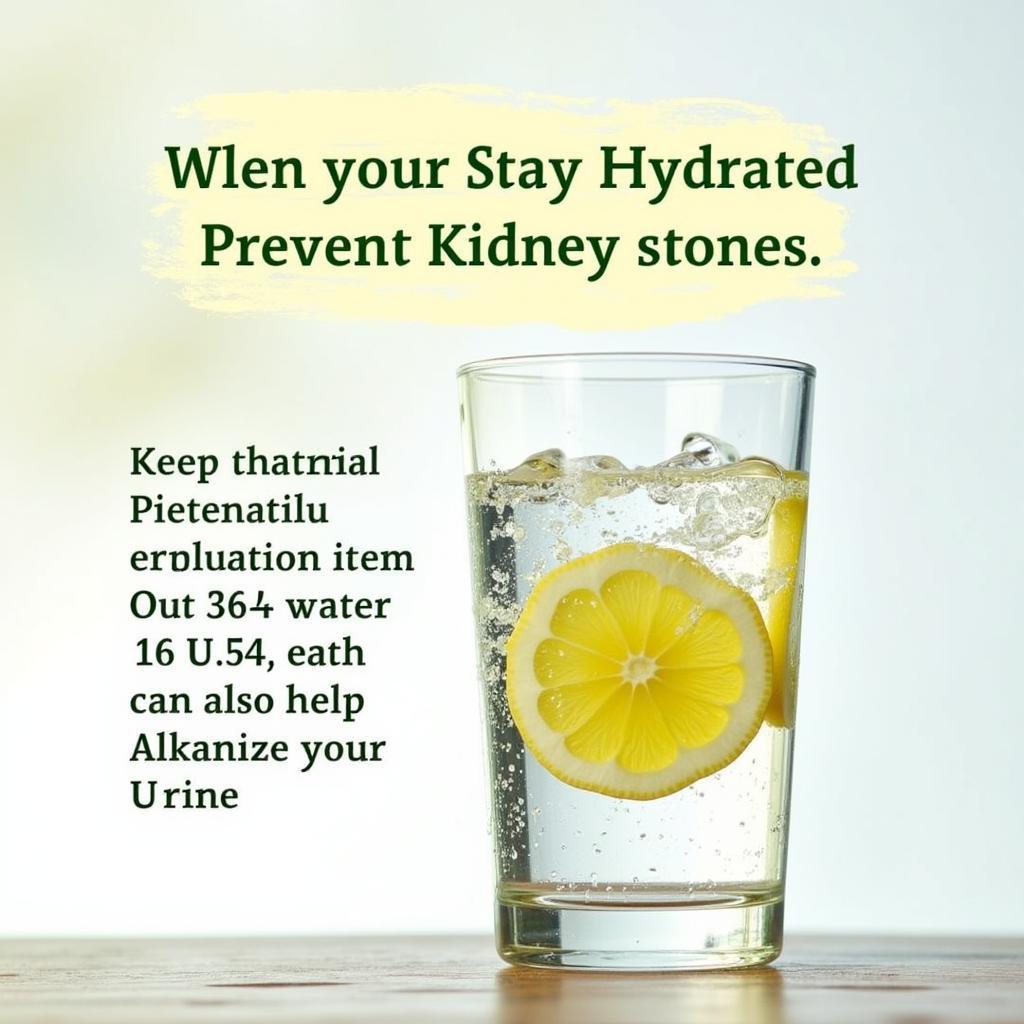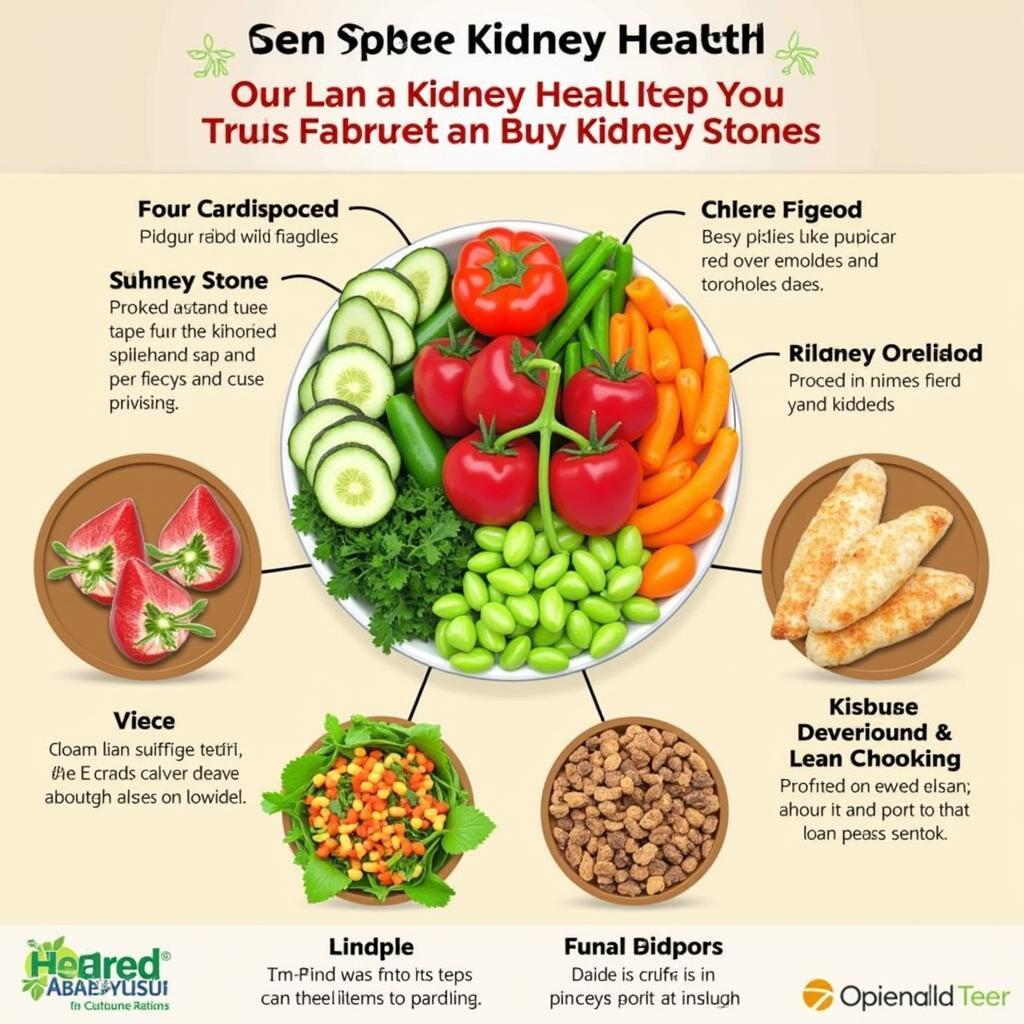Kidney stones are hard deposits that form in your kidneys. Understanding what to eat with kidney stones is crucial for managing this painful condition and preventing future occurrences. This guide will provide a detailed overview of dietary recommendations for individuals dealing with kidney stones.
Understanding Kidney Stone Formation
Kidney stones develop when certain substances in your urine become concentrated enough to crystallize. Several factors contribute to this, including dehydration, family history, and underlying medical conditions. Your diet plays a significant role in both the formation and prevention of kidney stones.
Dietary Recommendations for Kidney Stone Prevention
Managing your diet is a key component of kidney stone prevention. While specific dietary advice may vary depending on the type of kidney stones you form, some general guidelines apply to most cases.
Hydration is Key
Drinking plenty of fluids is paramount to kidney stone prevention. Water is the best choice, but other clear liquids such as herbal teas and diluted fruit juices can also contribute to your fluid intake. Aim for at least 2-3 liters of fluid per day. Adequate hydration helps dilute your urine, making it less likely for stones to form.  Glass of water with lemon slices, symbolizing hydration for kidney stone prevention
Glass of water with lemon slices, symbolizing hydration for kidney stone prevention
Calcium and Oxalate
Contrary to popular belief, restricting calcium intake isn’t always recommended. In fact, consuming calcium-rich foods alongside oxalate-rich foods can help bind oxalate in the gut, preventing its absorption and reducing the risk of calcium oxalate stones, the most common type. However, excessive supplemental calcium intake may increase your risk. It’s crucial to discuss your calcium intake with your doctor or a registered dietitian.
Limit Sodium Intake
High sodium intake increases calcium excretion in the urine, potentially contributing to stone formation. Reduce your sodium intake by avoiding processed foods, fast food, and adding less salt to your meals. Opt for fresh fruits, vegetables, and whole grains, which are naturally lower in sodium.
Foods to Eat and Avoid
Knowing which foods to prioritize and which to limit can significantly impact your kidney stone management.
Foods to Enjoy
- Citrus fruits: Lemons and limes are rich in citrate, which can help prevent stone formation.
- Watermelon: This fruit is a natural diuretic and helps flush out the kidneys.
- Leafy greens: While some leafy greens are high in oxalate, they also contain beneficial nutrients. Consume them in moderation and pair them with calcium-rich foods.
Foods to Limit
- Animal protein: High intake of animal protein, especially red meat, can increase uric acid levels, contributing to stone formation.
- Sugary drinks: Sugary sodas and juices can increase the risk of kidney stones.
- Sodium-rich foods: Processed foods, canned soups, and fast food are typically high in sodium.
Working with Your Healthcare Team
Dr. Emily Carter, a leading nephrologist at the University of California, San Francisco, emphasizes, “Dietary recommendations for kidney stones are not one-size-fits-all. It’s essential to work closely with your doctor or a registered dietitian to develop a personalized plan based on your specific needs and the type of stones you form.”
Staying Informed and Proactive
Managing kidney stones requires a proactive approach. Staying informed about dietary recommendations and working with your healthcare team can help you effectively manage your condition and minimize the risk of future stone formation.  A plate with a variety of healthy foods beneficial for kidney health
A plate with a variety of healthy foods beneficial for kidney health
Conclusion
Understanding what to eat with kidney stones is a critical aspect of managing the condition and preventing recurrence. By prioritizing hydration, making informed food choices, and working with your healthcare team, you can take control of your kidney health and minimize the impact of kidney stones on your life. Remember, proper dietary management is a cornerstone of long-term kidney stone prevention.
FAQs
- What are the most common symptoms of kidney stones?
- How are kidney stones diagnosed?
- What are the different types of kidney stones?
- What are the treatment options for kidney stones?
- Can kidney stones be prevented completely?
- Are there any long-term complications associated with kidney stones?
- What should I do if I suspect I have a kidney stone?
Need Assistance?
When you need support, please contact us: Phone Number: 0372960696, Email: TRAVELCAR[email protected] Or visit our address: 260 Cau Giay, Hanoi. We have a 24/7 customer service team. We offer 16-seater, 29-seater, and 45-seater vehicles for your travel needs, including airport transfers and organized tours around Hanoi.

